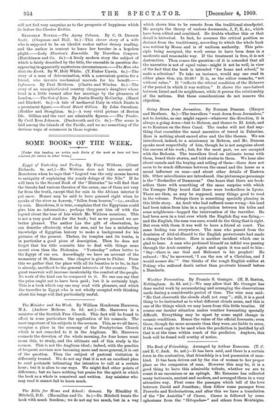which shows him to be remote from the traditional standpoint.
He accepts the theory of various documents, J, E', E, Sc.,: which have been edited and combined. He doubts whether this or that detail is historical. In fact, ho assumes the critical position as distinct from the traditionary, according to which the whole book was written by Moses and is of uniform authority. This prin- ciple being accepted, the work seems to have been done in a moderate and reasonable way. If the treatment is free, it is not destructive. Then comes the question—if it is conceded that all the narrative is not of equal value—might it not be well, in view of the fact that the book is intended "for home and school," to make a selection? To take an instance, would any one read in either place Gen. xix. 30-38? It is, as the editor remarks, "not without value." It "reflects the ethical condition of the Hebrews of the period in which it was written." It shows the race-hatred between Israel and its neighbours, while it proves the relationship of the nations. But these considerations do not remove the objection.






































































 Previous page
Previous page